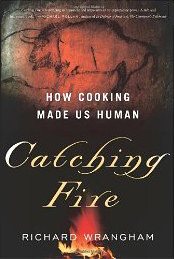Many people believe that raw meats are more digestible than cooked
meats when in fact, the opposite is true. Consider how much work is
involved in chewing a piece of raw steak, and how long that meat would sit in your stomach slowly being broken down by stomach acid. Lightly cooking (especially with water or steam) contributes to food digestion in
much the same way that stomach acid does. By opening up the coiled and
folded structures of proteins, cooking allows digestive enzymes easier access
to their interiors, facilitating digestion.
Richard Wrangham discusses the role of cooking in human evolution
in his book “Catching Fire: How Cooking Made Us Human”. Wrangham
explains that cooking greatly increased the digestibility of our foods and
postulates that this improved digestibility allowed our digestive tracts to
shrink and our brains to expand. Wrangham describes a study involving healthy humans and ileostomy patients (people who are missing part of their small intestines) who were fed 25g of protein, as either raw or cooked
egg. When the egg was cooked, protein digestibility ranged from 91-94%
in both groups. When the egg was raw, the protein digestibility was 65%
in the healthy volunteers and 51% in ileostomy patents. Wrangham says, “The gastroenterologists noted that heat predictably denatures proteins,
and that denatured proteins are more digestible because their open structure exposes them to the action of digestive enzymes (p 64-65). Cooking provided a 30-40% improvement in protein digestibility in this
study. Since meats are the most expensive component of any recipe, it
makes sense to maximize their nutritional value by lightly cooking them.
There are obviously significant differences in the digestive physiology
of a pet and a human. In fact, it could be argued that pets are closer to the
ileostomy patients in this study since they have much shorter digestive
tracts than healthy humans. Regardless, the basic premise holds. Proteins
must be “denatured” and broken down into amino acids which can be
absorbed into a pet’s body. Stomach acid denatures protein, as do digestive
enzymes produced by a pet’s pancreas and intestinal cells. Light cooking
also denatures protein and contributes to the digestive process allowing a
pet to get maximum value from the fresh meats in his/her diet.
Catching Fire provides a comprehensive review of the scientific research related to the digestibility of cooked versus raw foods. This book explains how cooking shaped our evolution by dramatically improving the digestibility of the foods we eat. Cooking yielded more fuel for our brains since less energy was required for food digestion and absorption. Without cooking we may never have evolved past Neaderthals. |

